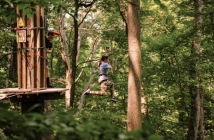“You want to know my actual opinion on OTAs?”
Evan Tipton pauses for a second and sighs.
“Let’s just say this: I’ve never had an operator come to me asking me for ideas on how to get more bookings from them.”
Tipton runs TOMIS, a marketing agency and travel technology provider that regularly has a presence at the ACCT annual conference. He’s noticed a steady increase in enquiries from aerial adventure operators looking to get away from online travel agencies, aka OTAs.
Steven Edwards is the COO of iWerx Connect, another adventure marketing business. His take is exactly the same: “Every operator we know is trying to get away from OTAs. They might use Groupon to get the customer to call, but they’d prefer to not have to deal with OTAs at all,” says Edwards.
The noise around OTAs is growing louder, and isn’t quieting down any time soon. What’s driving this? And more importantly, how should operators respond?
LEARN FROM OTHERS
As the old saying goes, “Those who cannot remember the past are condemned to repeat it.”
We’re in a unique position in the tour and activity space, in that we’ve been able to watch the direct bookings of an adjacent industry—hotels—get eaten alive by companies such as Booking.com and Expedia over the last 15 years.
I’ve been in the tour and activity game for years helping operators with web design, and as far back as 2014—as the drumbeat was starting to sound—most operators I spoke to were barely considering the coming tidal wave of new OTAs.
Think about it: if gigantic global brands such as Marriott have seen the need to fight back and gain more control with efforts such as the “it pays to book direct” campaign, you need to keep your wits about you and be cautious about which third parties—and how many of them—you get in bed with.
WHAT’S THE STATE OF PLAY?
It seems like everyone wants a piece of tours and activities right now. Here are just some of the categories of companies making a push to get in on our burgeoning industry:
Global Players: The top few companies worldwide right now are TripAdvisor, Expedia, GetYourGuide, and Klook.
Local Specialists: Florida operators will be familiar with TripShock and its family of websites. Hawaiians will know Best of Hawaii. Companies like these don’t get much attention, but can make up a huge part of an operator’s revenue mix. For example, TripShock delivers more than 50 percent of some operators’ bookings on the Florida west coast. That’s a huge number.
Growing Fast: Peek (disclaimer: I consult to Peek), TravelZoo, Headout.com, and Adrenaline.com.
Invaders: Google, Booking.com, Groupon, and, reportedly, even Amazon are pushing in.
This is just a small sampling of examples picked from a pool of hundreds that are at least dipping their toes—if not fully diving in.
Big concern. Commissions are variable, but mostly range from 15 to 25 percent. I’ve also gotten word of some companies paying up to 60 percent commission (not a typo!) of the ticket price in exchange for guaranteed marketing spend.
I’ve also heard of “non-negotiable” commission terms suddenly becoming negotiable, even for very small operators who are willing to be both stubborn and patient.
Little impact? Despite the noise, OTAs still represent a small portion of bookings. TOMIS reports that typical operators on their platform see less than five percent of bookings originating with third-party sellers. Peek sees similar results. But there’s a big caveat: The OTA market share is growing rapidly.
What does this mean for you?
#1: GET BETTER
Edwards believes that a lot of mediocre adventure-business operators will be the first to suffer. It takes serious business chops to continue to thrive if you’re shipping 25 percent of your ticket price to OTAs: “You see so many adventure companies here [in Las Vegas, Nev.]. It’s not because they are zip line or ATV experts. Many of them haven’t put together the best product possible, and they’ll be the first to go out of business,” says Edwards.
According to Edwards, each operator hoping to get more direct bookings (and avoid OTAs) should focus first on nailing the basics: taking care of your customers, getting good reviews, and having a great website.
#2: GET CLEVER
Peter Syme is an adventure park operator from Scotland who has been attracting attention lately for his outspoken views on the topic of OTAs.
According to him, it’s time to stop being complacent when it comes to your most valuable asset: your customer relationships. It’s important to encourage your customers to engage on social media, and develop post-visit email marketing strategies to keep customers engaged—these are two ways you can maximize the value of each visitor.
“We, the operators, happily feed the OTAs with supply, because they can reach customers we cannot,” says Syme. “By doing so, we are ignoring the longer game, and surrendering our direct customer relationships. Your only strategic advantage as an operator is your customer relationships!”
#3: GET INTO THE NUMBERS
Oskar Bruening is chief technology officer at Peek. He doesn’t sit idle in front of a computer, though. Having visited literally hundreds of companies across the entire spectrum of tours and activities, his advice is to get deep into the numbers. They may show that there are instances when OTAs—or other channels—can be of real benefit.
Maximizing each group. “If I have a group already going out on a zip line course, I can sell my last spots and double my profit. This is why operators are attracted to OTAs,” says Bruening. “If I can give someone 20 percent to sell a last spot that was empty, why wouldn’t I do it?”
But are enough operators actually looking for other ways to sell that final spot? To that end, Bruening has recently been testing a new mechanism on Peek Pro’s platform to increase last-minute sales.
The idea is simple: if you already have enough spots filled to run a tour, you should keep online bookings open right up until the departure and hoover up any last-minute demand. The results have been positive, with some involved in the trial seeing increases in online bookings of more than 10 percent.
This is especially notable, given that Peek’s data shows that direct bookings are worth more than OTA bookings—even before factoring in commissions. This is because bookings through OTAs tend to be smaller, with just one or two tickets being purchased.
Peek Pro is not the only reservation system working to drive incremental last-minute sales. Talk to your platform provider and ask how they can equip your business to do the same.
Revenue vs. profit. It’s also easy to forget the difference between revenue and profit. If you’re earning $100 per booking and paying 25 percent in commission on that, how much actual profit will be left over?
Syme says those profits may be less than some think. “It’s not 20-30 percent of revenue. We the supplier base [i.e., the adventure park operator] need to stop thinking about revenue, we need to start thinking about profit,” he says. “I understand numbers, and if you have 20-30 percent going to the OTA, that’s more 50 percent of the gross profit. That’s unsustainable if you’re running a business that loses the majority of distribution to the OTAs.”
#4: INCREMENTAL VS. CORE SALES: WHAT PLACE ARE YOU GIVING TO YOUR OTA?
As Peek’s Bruening says: “The last seats are the most valuable ones to an operator.” This is true. If you have covered the cost for the tour already, those last few sales will contribute directly to the bottom line—even if you have to pay a hefty commission. But most adventure parks rightly aim to book their core sales themselves.
When assessing whether to access the resources of an OTA, the question should be: Can the OTA drive additional incremental sales that you were never going to see?
Major parks such as Disney or Universal Studios ask these questions of all OTAs who come knocking on their doors. Why would they give up 15 percent for a booking if someone is literally typing “Disney World tickets” into a search engine? You may not play at Disney’s level, but you should ask the same question of any OTA that pitches you.
Also, don’t ask them what they’re “going” to do, ask them what they are already doing for existing partners. This will be highly illustrative of the value of the relationship.
#5: DOUBLE DOWN ON DIRECT MARKETING
Booking.com, the hotel booking engine, has caused great controversy with some of its online marketing strategies. It wasn’t just bidding on search terms such as “Miami hotels” or “Sydney accommodations”—anger erupted when it was caught bidding on the actual brand names of local hotels.
Imagine the hotels’ plight: they were giving 20 percent to an OTA for a booking that they would have gotten anyway. Since the OTA bid higher for search terms that included the hotel’s own brand name, the hotel’s website wound up farther down in the results.
Fighting back. Bidding on Google Ads—formerly known as Google AdWords—to be number one for your own brand is just step one to fighting back. Michelle Micallef of TOMIS is seeing aerial adventure operators succeed by doubling down on SEO and Ads in tandem.
“On average, every new visitor from organic traffic generates an extra $4.50 to $11.75 in online revenue, and every $1 spent on Google Ads generates $8 in return,” says Micallef. “While our clients make up a tiny fraction of the industry, it is proof that you can still increase direct bookings amidst the ever-increasing presence of OTAs.”
Syme agrees, but in 2020’s competitive environment, he recommends using only professionals to manage and execute online campaigns—the return is worth the investment. “Customer acquisition costs will increase due to the increased cost to market in the digital environment. Anyone who questions this should sit down for a beer with an independent hotel operator who has been in business for more than 10 years and see what they have to say,” he says.
While it is permitted by Google that OTAs bid against your brand name in searches, they can’t actually include a trademarked term in the ad itself. That won’t stop them from trying, though. Having a trademark is necessary to pull those ads from Google, but before contacting an attorney you should consider more direct methods.
If you see your brand name being used in an ad, call your OTA contact and politely, but firmly, ask them to stop. Follow up to ensure that it happens. If your contact doesn’t comply, ask the same of another employee at the company. If even that doesn’t work, only then should legal action be considered.
#6: WORK WITH THE BEST
You’ve done your numbers, improved your business, and are humming along with an efficient, profitable operation. Is it now time to work with OTAs in some way? Perhaps, but first do some homework.
Check out which OTAs are advertising heavily in your area, and that also need a unique offering like yours. Do some Googling to see if any local OTAs are doing work in your area. Do other operators recommend them? Do they actually get sales? All you need to do is pick up the phone and ask.
Next, go through each of the categories mentioned earlier—global players, local specialists, etc.—and make a short list of OTAs that seem to be a good fit. When you get in touch with them, here are some questions you should ask:
• What is the commission? Is it negotiable? If it’s not, ask to confirm that no other operators in your area are benefiting from a lower commission.
• What does the OTA do to drive incremental sales?
• How does its algorithm work? What do you need to gain exposure to more guests?
• Does it feature operators in its marketing, such as blog posts? Can the OTA feature you?
#7: WHAT ABOUT REVIEWS?
TripAdvisor has dominated the review space. Should you keep encouraging your guests to leave reviews on a site that used to be free, but now takes a hefty clip of each sale?
According to Edwards, reviews matter—just don’t get wedded to one platform. “As big as TripAdvisor is, it’s not like Amazon or Booking.com,” he says. “People still start their search in Google. TripAdvisor might be ranking well enough, but Google is where it starts.”
TOMIS’ Tipton adds: “With the data at our disposal, we’ve run correlation analyses between total booking revenue and numbers of reviews across these platforms. TripAdvisor reviews are most highly correlated with total revenue, but we expect this to level out as Google continues to push into the sector.” Operators may want to consider driving guests to submit reviews on other platforms that aren’t also an OTA, such as Facebook or Google.
And before you take the plunge with an OTA, ask yourself: Which problem is the OTA actually solving for my business? Am I sure that solving my revenue headaches through a low-risk, high-commission model is going to serve me well in the long run?
Only one thing is guaranteed: moving into 2020, this topic is only going to get thornier for operators in this industry.






